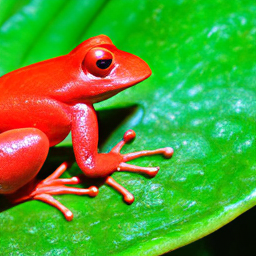🚀 Karlo v1 alpha
Karlo is a text-conditional image generation model. It's based on OpenAI's unCLIP architecture. It has an improved super - resolution model that can upscale from 64px to 256px and recover high - frequency details in just a few denoising steps.
🚀 Quick Start
Karlo is available in diffusers! You can start using it by following the steps below.
📦 Installation
First, you need to install the necessary libraries:
pip install diffusers transformers accelerate safetensors
💻 Usage Examples
Basic Usage
Text to image
from diffusers import UnCLIPPipeline
import torch
pipe = UnCLIPPipeline.from_pretrained("kakaobrain/karlo-v1-alpha", torch_dtype=torch.float16)
pipe = pipe.to('cuda')
prompt = "a high-resolution photograph of a big red frog on a green leaf."
image = pipe([prompt]).images[0]
image.save("./frog.png")

Image variation
from diffusers import UnCLIPImageVariationPipeline
import torch
from PIL import Image
pipe = UnCLIPImageVariationPipeline.from_pretrained("kakaobrain/karlo-v1-alpha-image-variations", torch_dtype=torch.float16)
pipe = pipe.to('cuda')
image = Image.open("./frog.png")
image = pipe(image).images[0]
image.save("./frog-variation.png")

📚 Documentation
Model Architecture
Overview
Karlo is a text - conditional diffusion model based on unCLIP, which consists of prior, decoder, and super - resolution modules. In this repository, we have an improved version of the standard super - resolution module. It can upscale from 64px to 256px in only 7 reverse steps, as shown in the figure below:

Specifically, the standard SR module trained by the DDPM objective upscales 64px to 256px in the first 6 denoising steps using the respacing technique. Then, the additional fine - tuned SR module trained by VQ - GAN-style loss performs the final reverse step to recover high - frequency details. This approach is very effective for upscaling low - resolution images in a small number of reverse steps.
Details
We trained all components from scratch on 115M image - text pairs, including COYO - 100M, CC3M, and CC12M. For the Prior and Decoder, we used ViT - L/14 from OpenAI’s CLIP repository. To improve efficiency, we replaced the trainable transformer in the decoder with the text encoder in ViT - L/14, different from the original unCLIP implementation. For the SR module, we first trained the model using the DDPM objective for 1M steps, followed by an additional 234K steps to fine - tune the additional component. The following table summarizes the important statistics of our components:
| Property |
Prior |
Decoder |
SR |
| CLIP |
ViT - L/14 |
ViT - L/14 |
- |
| #param |
1B |
900M |
700M + 700M |
| #optimization steps |
1M |
1M |
1M + 0.2M |
| #sampling steps |
25 |
50 (default), 25 (fast) |
7 |
| Checkpoint links |
[ViT - L - 14](https://arena.kakaocdn.net/brainrepo/models/karlo-public/v1.0.0.alpha/096db1af569b284eb76b3881534822d9/ViT - L - 14.pt), [ViT - L - 14 stats](https://arena.kakaocdn.net/brainrepo/models/karlo-public/v1.0.0.alpha/0b62380a75e56f073e2844ab5199153d/ViT - L - 14_stats.th), [model](https://arena.kakaocdn.net/brainrepo/models/karlo-public/v1.0.0.alpha/efdf6206d8ed593961593dc029a8affa/decoder - ckpt - step%3D01000000 - of - 01000000.ckpt) |
[model](https://arena.kakaocdn.net/brainrepo/models/karlo-public/v1.0.0.alpha/85626483eaca9f581e2a78d31ff905ca/prior - ckpt - step%3D01000000 - of - 01000000.ckpt) |
[model](https://arena.kakaocdn.net/brainrepo/models/karlo-public/v1.0.0.alpha/4226b831ae0279020d134281f3c31590/improved - sr - ckpt - step%3D1.2M.ckpt) |
In the checkpoint links, ViT - L - 14 is the same as the original version, but we included it for convenience. Note that ViT - L - 14 - stats is required to normalize the outputs of the prior module.
Evaluation
We quantitatively measured the performance of Karlo - v1.0.alpha on the validation split of CC3M and MS - COCO. The following tables show the CLIP - score and FID. To measure FID, we resized the shorter side of the image to 256px and then cropped it at the center. We set the classifier - free guidance scales for the prior and decoder to 4 and 8 in all cases. Our model achieved reasonable performance even with 25 sampling steps of the decoder.
CC3M
| Sampling step |
CLIP - s (ViT - B/16) |
FID (13k from val) |
| Prior (25) + Decoder (25) + SR (7) |
0.3081 |
14.37 |
| Prior (25) + Decoder (50) + SR (7) |
0.3086 |
13.95 |
MS - COCO
| Sampling step |
CLIP - s (ViT - B/16) |
FID (30k from val) |
| Prior (25) + Decoder (25) + SR (7) |
0.3192 |
15.24 |
| Prior (25) + Decoder (50) + SR (7) |
0.3192 |
14.43 |
For more information, please refer to the upcoming technical report.
Training Details
This alpha version of Karlo was trained on 115M image - text pairs, including the [COYO](https://github.com/kakaobrain/coyo - dataset)-100M high - quality subset, CC3M, and CC12M. If you're interested in a better version of Karlo trained on larger - scale high - quality datasets, please visit the landing page of our application B^DISCOVER.
📄 License
The model is released under the creativeml - openrail - m license.
BibTex
If you find this repository useful in your research, please cite:
@misc{kakaobrain2022karlo-v1-alpha,
title = {Karlo-v1.0.alpha on COYO-100M and CC15M},
author = {Donghoon Lee, Jiseob Kim, Jisu Choi, Jongmin Kim, Minwoo Byeon, Woonhyuk Baek and Saehoon Kim},
year = {2022},
howpublished = {\url{https://github.com/kakaobrain/karlo}},
}



 Transformers
Transformers